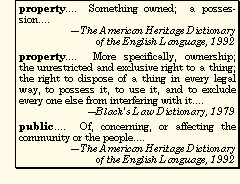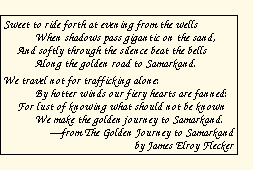Yield: Right of Way
inherent in the definition of property is the fact of
ownership. At the same time, a thing that is public cannot be owned
but is the domain and concern of the entire community. Thus, the
concept of public property is a contradiction in terms. There can't
be any such thing as public property.
Today, most public land is covered by private property in the form of
roads. In each case, the private property is owned by a government.
Notice that a government isn't the community. It isn't the people.
It's a corporation, a body politic, an individual person for legal purposes.
Thus, the roads are not public. They are private property each of
which is owned by a government.
Extortion — Associated with the roads is a set of traffic regulations.
Those regulations were enacted by the parties that own the roads.
However, the owner of property can legitimately regulate the use of only
what he owns. Thus, the traffic regulations apply to the use of the
roads but not to the use of the public land under the roads. The
use of land that is public cannot legitimately be regulated by legislation
because the legislatures do not own the public land. The use of public
land can be regulated only by such customs of use as have evolved from
antiquity within the community.
However, the owners of the roads have arranged their property in such
a way as to absolutely and completely obstruct all access to the public
land. They have made it impossible for anyone to exercise the Right
of Way upon the public land. They have dictated instead that people
can travel only upon the private property. That is an unlawful conversion
of the Right of Way into a privilege of use. Upon that privilege
of use the owners of the roads have placed prerequisites that reduce every
applicant into a condition of servitude. Government will admit only
two alternatives. A traveller must either submit to the rules and
pay the fees or remain forever imprisoned by the barrier of roads that
obstruct his access to the public land.
The Remedy — The owners of the roads cannot legitimately regulate
the use of what isn't theirs, that is, the public land. Furthermore,
travel isn't a privilege. It's a necessity of survival. So
long as governments force people to use the roads as the only possible
way to travel, then the people don't have any obligation to the traffic
regulations because there isn't any obligation under duress. Only
when the use of the roads is a voluntary choice between alternatives does
an obligation accrue. Therefore, the remedy is clear. The traveller
must neither pay the fees nor acknowledge the traffic regulations.
He must exercise the Right of Way and use the public land as if the roads
were not there. If the owners of the roads object, then they can
remove their property from the public land. They can put it someplace
where it isn't in the way, where it doesn't obstruct the access to the
public land, and where it doesn't interfere with the exercise of the Right
of Way. The owners of the roads have committed the violation.
The owners of the roads should yield.
|

![]()
 Public
Land — Originally, all land was public land and the concept didn't
have a special name because it didn't need one. So long as men moved
freely about the business of survival, there wasn't a need to distinguish
between the different legal categories of land. There was only the
one category. Eventually, people fenced pastures as early pastoral
cultures arose, or planted crops in early agrarian settlements. When
men began to feel protective or possessive about certain pieces of land,
and began to control access to and use of that land, then they owned the
land. When that happened, the land became property. After that,
there was more than one category of land. The remaining public land
became discernible as the part that wasn't owned.
Public
Land — Originally, all land was public land and the concept didn't
have a special name because it didn't need one. So long as men moved
freely about the business of survival, there wasn't a need to distinguish
between the different legal categories of land. There was only the
one category. Eventually, people fenced pastures as early pastoral
cultures arose, or planted crops in early agrarian settlements. When
men began to feel protective or possessive about certain pieces of land,
and began to control access to and use of that land, then they owned the
land. When that happened, the land became property. After that,
there was more than one category of land. The remaining public land
became discernible as the part that wasn't owned.
 The
Roads — Any land upon which the Right of Way is customarily exercised
is public land. Indeed, private property will become public land
if the Right of Way is customarily exercised upon it. Such use has
always been recognized as necessary, proper, and inevitable. Throughout
history, strips of public land have been preserved for the use of travelers.
The
Roads — Any land upon which the Right of Way is customarily exercised
is public land. Indeed, private property will become public land
if the Right of Way is customarily exercised upon it. Such use has
always been recognized as necessary, proper, and inevitable. Throughout
history, strips of public land have been preserved for the use of travelers.